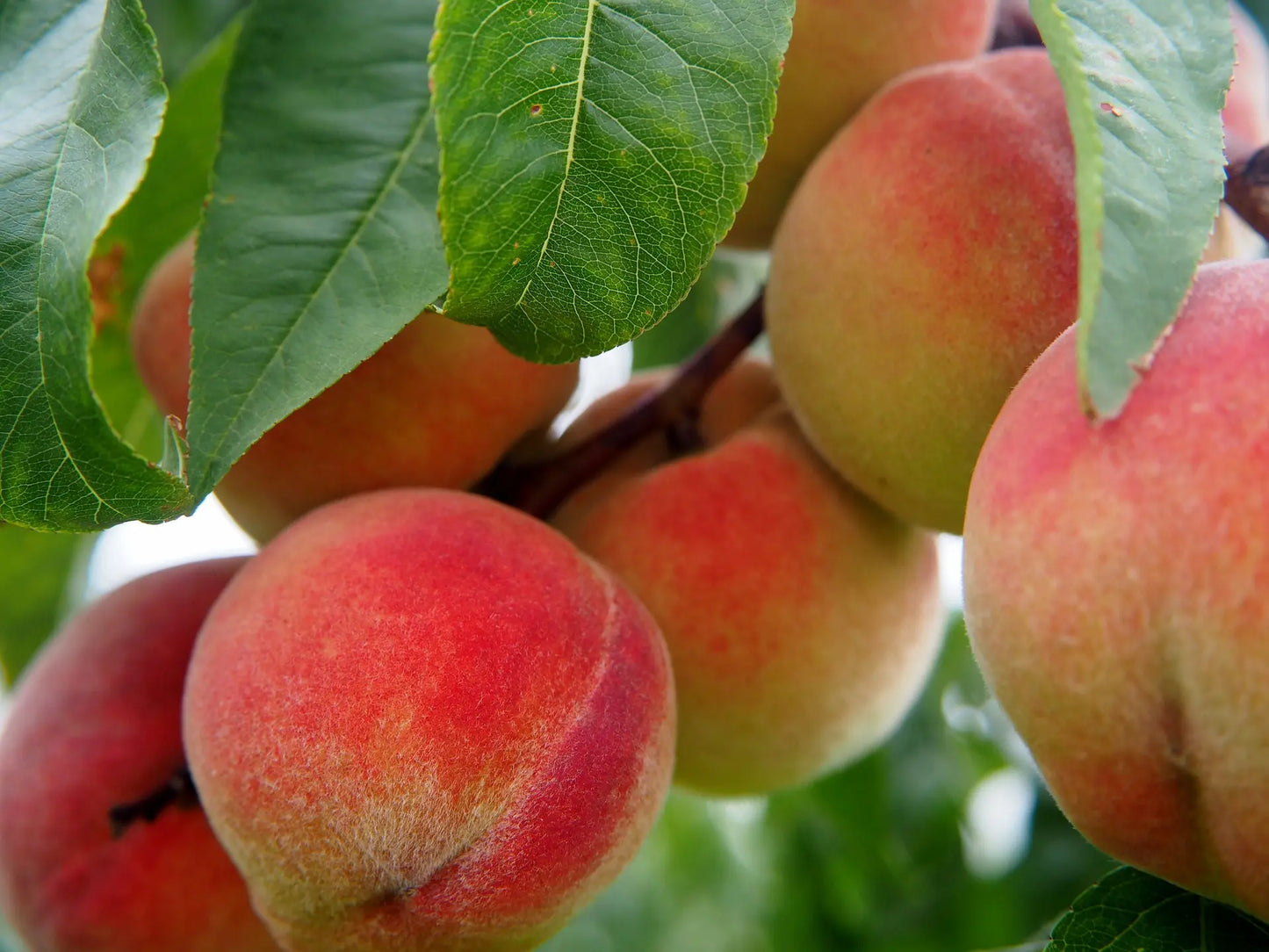-
Delivery from 10 plants to France, Switzerland and Europe
Delivery method -
Fruit Tree Wholesale Supplier
About Us -
Quality Fruit Tree Plants
Technical itinerary
Sanguine Peach Half-Standard Tree 8-10 cm diameter bare-root
Sanguine Peach Half-Standard Tree 8-10 cm diameter bare-root
The prices shown are our base prices for large volumes. Depending on the quantity ordered and the producers’ pricing scales, the rate may be adjusted upward. Each quote is personalized to ensure you receive a fair price.
Mini order 10 units / Multiple orders 10 units (FRS202412002)
Couldn't load pickup availability
 Buy now and get it delivered when you're ready to plant - Add your desired date to your quote request
Buy now and get it delivered when you're ready to plant - Add your desired date to your quote request
- Delivery from 10 plants to France, Switzerland and Europe

Technical sheet of the Sanguine variety
- Fruit color: Orange-red to dark red
- Flesh color: Blood red when ripe. White evolving to blood red.
- Size and shape: Medium size, round or almost spherical fruits.
- Tree size: Height of 2.5m to 3m at maturity depending on the shape.
- Fruit maturity: Mid-August to September.
- Fruit taste: Juicy, sweet, tangy and fragrant.
- Earliness of the variety: Medium to early (Sanguine d'Août), late (Sanguine de Savoie).
- Fruiting period: Mid-August to September.
- Disease resistance and storage: Resistant to diseases, particularly peach leaf curl (Sanguine de Savoie). Short storage, a few days in a cool place.
- Variety yield: Productive. Average yield of 4.5 tonnes per hectare for a single-variety plantation.
- Is this variety self-fertile? Yes.
- Commercial use: Fresh consumption, compotes, jams, preserves.
- Comments: Adapted to varied climates, ideal for family gardens. Prefers light, drained, calcareous soils.
Quick read / the essentials on Pêcher Sanguine
The Blood Peach is a hardy and highly productive variety, prized for its intense red flesh and its sweet, fragrant, slightly acidic taste . Originally from northern China , it is particularly well suited to cold climates and high-altitude crops , thanks to its late flowering , which allows it to avoid spring frosts. Grown particularly in the Tain l'Hermitage region and on the Coteaux du Lyonnais , it is a strategic choice for producers wishing to diversify their offering with a variety with strong visual and taste appeal.
Its fruits, oval to round in shape , have a bright red skin marbled with yellow , with juicy and very aromatic flesh , ideal for fresh consumption, jams, compotes and food processing . Harvesting takes place between August and October , depending on the sub-varieties and climatic conditions. Although they keep for about a week , their taste quality and aesthetic appeal to consumers and chefs alike.
The tree, of modest size (1.80 m to 4 m at maturity) , is vigorous and self-fertile , guaranteeing regular and abundant production . It adapts well to small orchards as well as to intensive plantations , particularly in well-drained soil. To optimize productivity, it is recommended to plant two trees of the same variety in order to improve pollination and fruit size.
The Blood Peach is appreciated for its good resistance to diseases , notably peach leaf curl , although it is sensitive to excess limestone . A light and well-drained soil is essential to avoid root asphyxiation. Several suitable rootstocks are available depending on the nature of the soil, such as GF677 for deep soils , Montclar for less fertile land , or Rubira for calcareous soils .
If you are looking for a hardy and high-performing variety, buying Blood Peach plants from a specialist peach plant wholesaler ensures profitable production and exceptional fruit quality. Our Blood Peach plants are carefully selected to ensure optimal adaptation and vigorous growth .
As a specialist wholesale supplier of peach plants , we provide high-quality Blood Peach plants , adapted to the requirements of professional arborists. Trust our expertise to buy Blood Peach plants and succeed in your cultivation with a variety prized for its visual appeal and taste quality.
Presentation of the Blood Peach Tree for professional arborists
The Blood Peach is a hardy and productive variety, particularly appreciated for the intense color of its flesh and the taste quality of its fruits. Mainly cultivated in the region of Tain l'Hermitage and on the Coteaux du Lyonnais , this peach tree originates from northern China . It is renowned for its resistance to cold , its late flowering which allows it to avoid spring frosts, as well as for its adaptation to cultivation at altitude.
Fruit characteristics
The Blood Peach tree produces fruit with blood-red flesh , juicy and fragrant. Its taste is sweet, slightly acidic and very aromatic , which makes it ideal both for fresh consumption and for processing into jams, compotes and preserves .
The bright red skin is marbled with yellow and washed with an intense red on the sun-exposed side, giving it an attractive appearance. The fruit shape is oval to round , with slight irregularity and the presence of a prominent mucro in some years .
The fruits ripen between August and October , depending on the sub-varieties and climatic conditions. Their shelf life is approximately one week , with the possibility of extending them by a few more days if stored in the refrigerator.
Tree characteristics
The Blood Peach is a modestly sized tree, generally reaching 1.80 m to 4 m in adulthood, which makes it suitable for small orchards and intensive cultivation. It is vigorous, rustic and very productive , guaranteeing a regular harvest from year to year.
This variety is self-fertile , meaning it does not require a pollinator to bear fruit. However, it is advisable to plant two trees of the same variety to maximize yield and fruit size.
Its late flowering makes it an ideal option for regions with cold climates , as it reduces the risk of damage to flowers by spring frosts.
Growing conditions and maintenance
The Blood Peach adapts to various soil types , but prefers light, well-drained, and constantly moist soil. It fears excess water and does not tolerate soils that are too heavy and compact. For poor or calcareous soils, the use of a suitable rootstock such as Rubira helps ensure greater resilience of the tree.
Its maintenance requires annual pruning to stimulate fruiting and limit the exhaustion of the tree. Abundant watering after planting is recommended to ensure good development of the root system.
The Blood Peach tree has good resistance to diseases and pests , particularly peach leaf curl . However, it remains sensitive to excess limestone and requires sunny exposure protected from the wind for optimal production.
Recommended rootstocks
For successful cultivation in France, several rootstocks are recommended depending on the type of soil:
- GF677 : Adapted to deep, rich soils, promotes tree vigor and productivity.
- Montclar : Suitable for less fertile soils, producing a tree of medium strength.
- Rubira : Ideal for poor or calcareous soils, limits the size of the tree but improves its resilience.
Yield and economic interest
The yield of the Blood Peach varies between 0 and 9 kg per tree , with an average of around 4.5 tonnes per hectare for a single-variety plantation at a density of 500 trees/hectare . Its productivity makes it an economically viable variety for arboriculturists wishing to diversify their production.
The fruits are particularly prized for table consumption , thanks to their dark red and fragrant flesh , but also for processing into jams, compotes and preserves . They go well with certain gastronomic products such as wine or duck , which makes them a popular variety in high-end cuisine.
Conclusion
The Blood Peach is a hardy, productive variety suitable for temperate and cold climates . Its late flowering , disease resistance and unique taste make it an attractive option for growers looking for a peach variety that is both attractive and tasty. Although requiring regular maintenance and well-drained soil, it produces high-quality fruit , appreciated both fresh and for processing, with excellent commercial potential.
To summarize: Pêcher Sanguine
The Blood Peach is a hardy and productive variety , ideal for temperate and cold climates thanks to its late flowering , which reduces the risk of frost. With a staggered harvest between August and October , its intense red, juicy and sweet fruits are particularly prized for fresh consumption and for processing into jams, compotes and preserves . Its bright red skin marbled with yellow gives it a strong appeal on the market.
The tree, of modest size but vigorous , is self-fertile and adapts well to small orchards and intensive cultivation . For increased productivity , it is recommended to plant several trees of the same variety . Its maintenance is based on annual pruning , which promotes good fruiting and limits the exhaustion of the tree .
Thanks to its good resistance to diseases , particularly peach leaf curl , it requires few phytosanitary treatments. However, it is sensitive to soils that are too calcareous , which requires the choice of a suitable rootstock such as Rubira for poor, calcareous soils or GF677 for deep, rich soils .
As a specialist wholesale supplier of peach plants , we offer Blood Peach plants selected to ensure regular production and optimal adaptation to your growing environment.
If you want to diversify your production with a rustic, resistant and commercially attractive variety , buying Blood Peach plants from a specialist peach plant wholesaler will allow you to optimize your orchard and meet consumer expectations with aesthetic and tasty fruits .
-
Sanguine Peach Scion bare-root organic
Regular price €14,35 EURRegular priceUnit price / per -
Sanguine Peach Scion bare-root
Regular price €10,55 EURRegular priceUnit price / per -
Sanguine Peach Half-Standard Tree 8-10 cm diameter bare-root
Regular price €24,50 EURRegular priceUnit price / per -
Sanguine Peach Half-Standard Tree 6-8 cm diameter bare-root
Regular price €21,90 EURRegular priceUnit price / per -
Sanguine Peach Half-Standard Tree 10-12 cm diameter bare-root
Regular price €26,00 EURRegular priceUnit price / per



